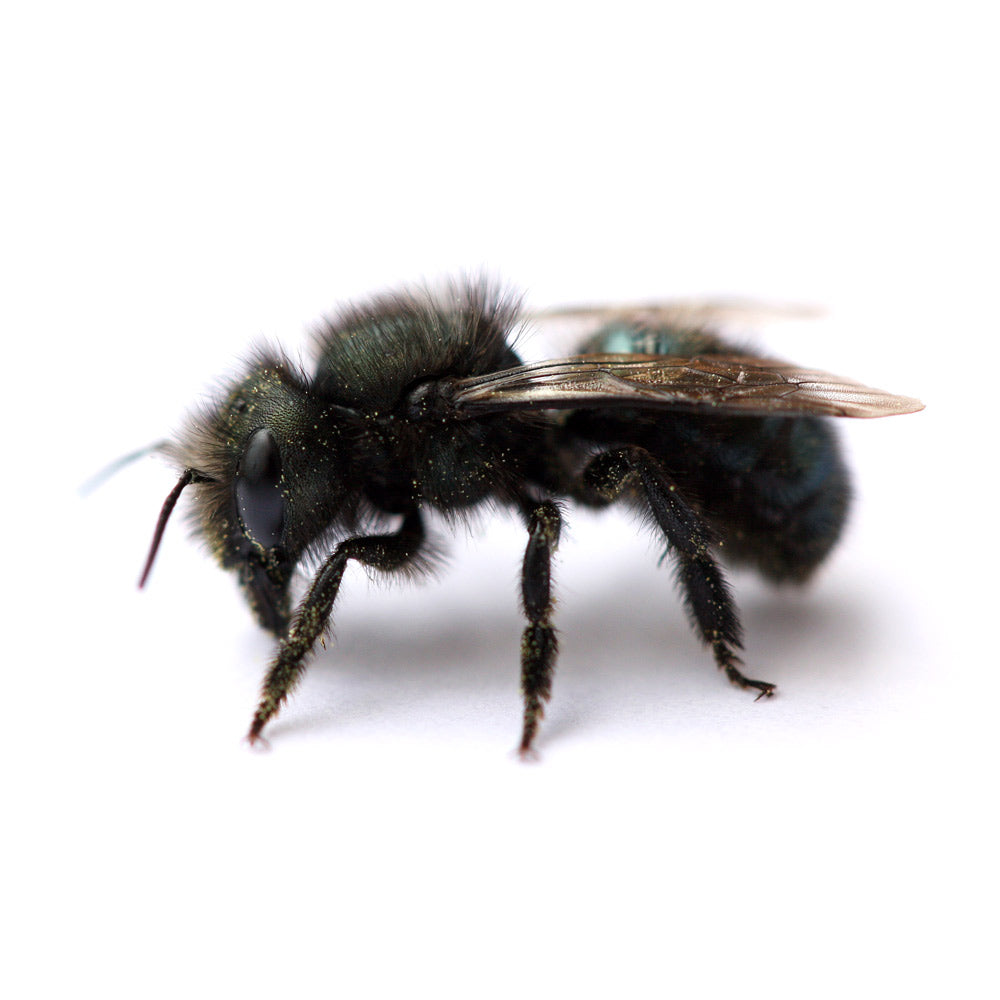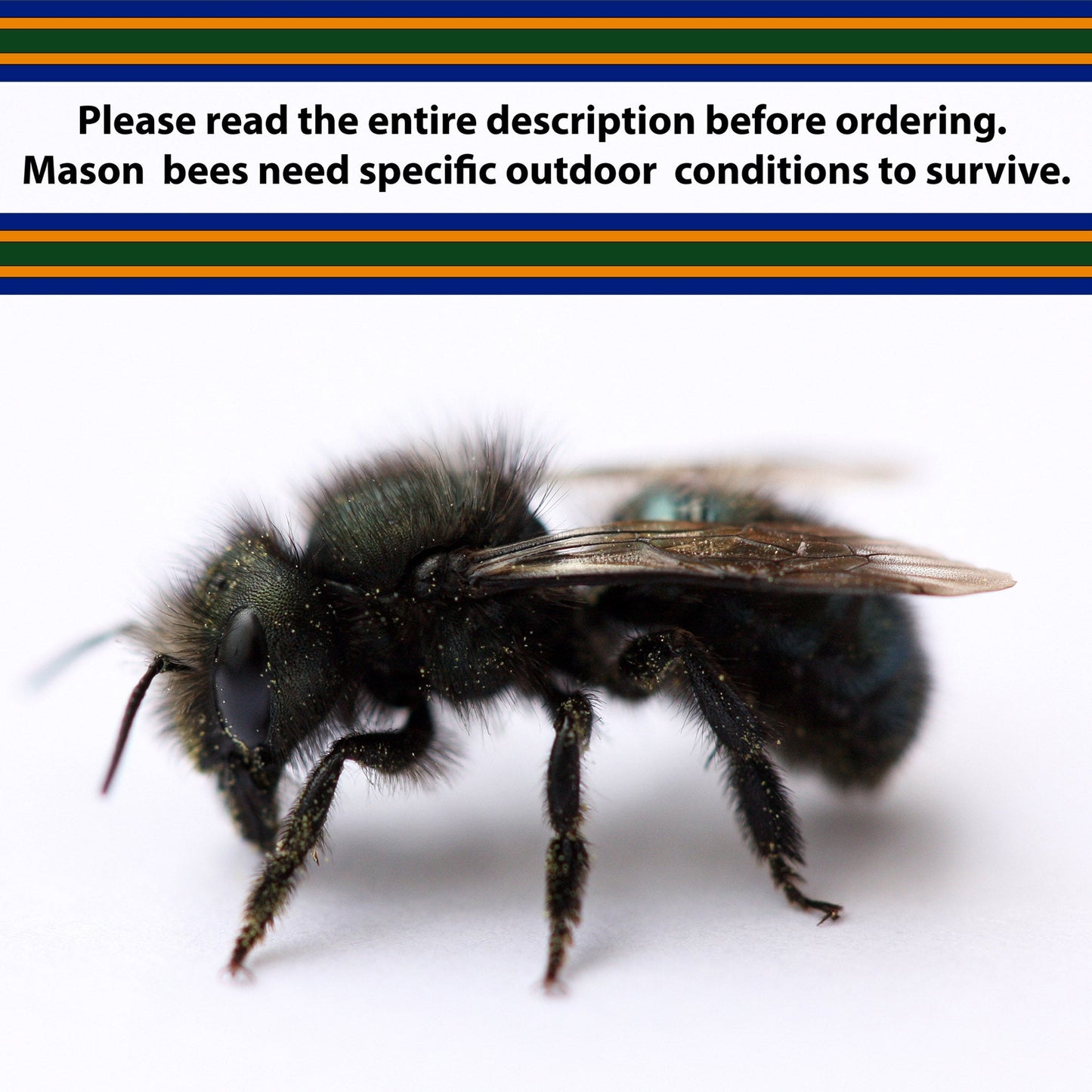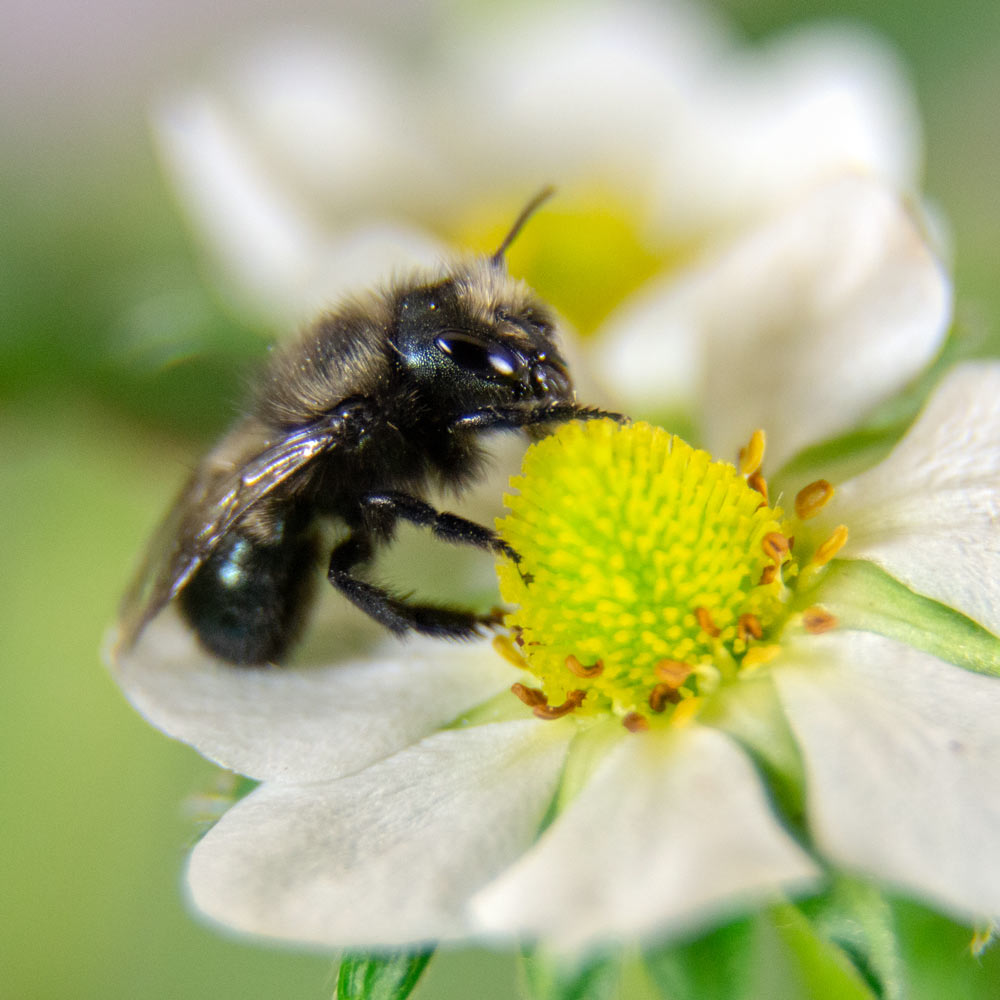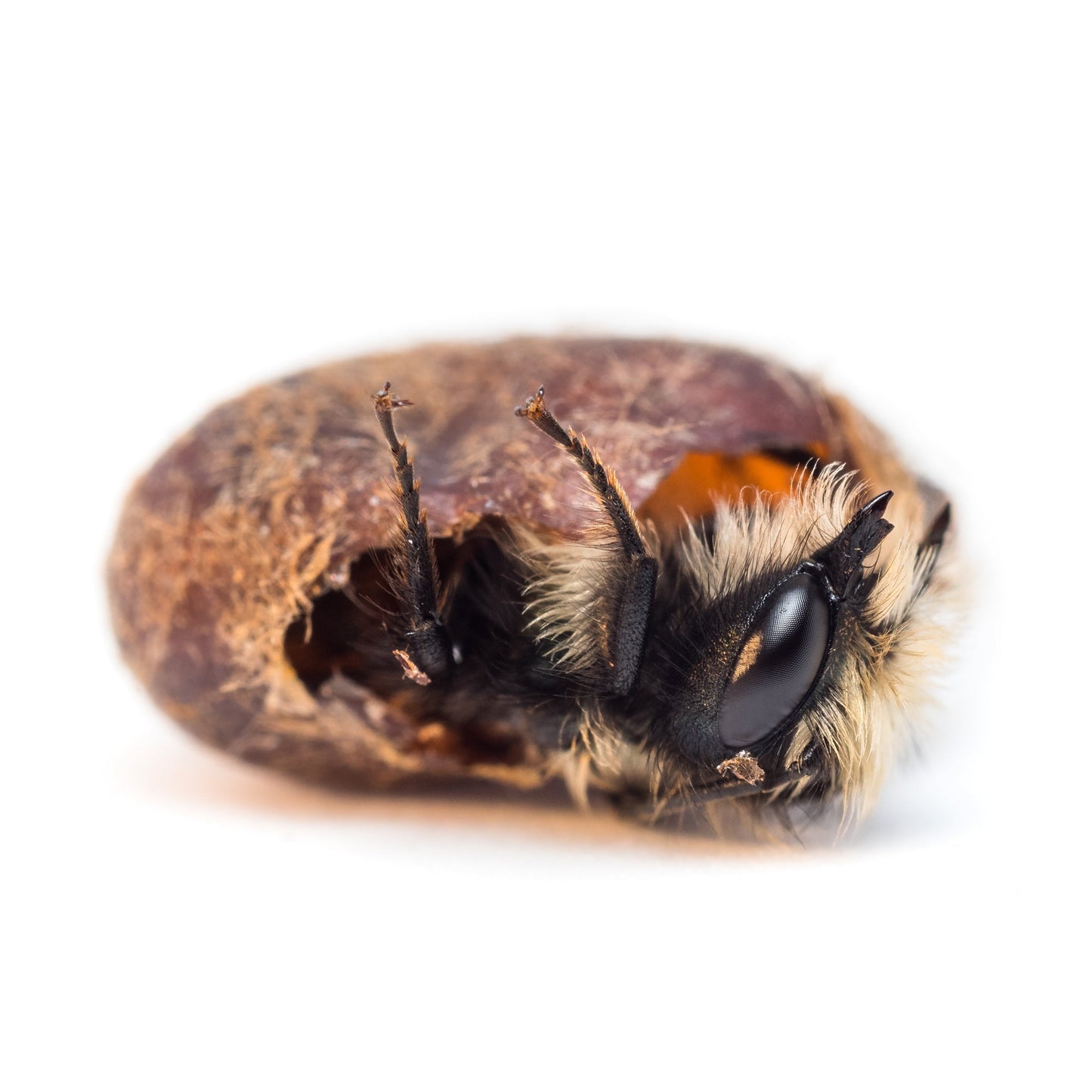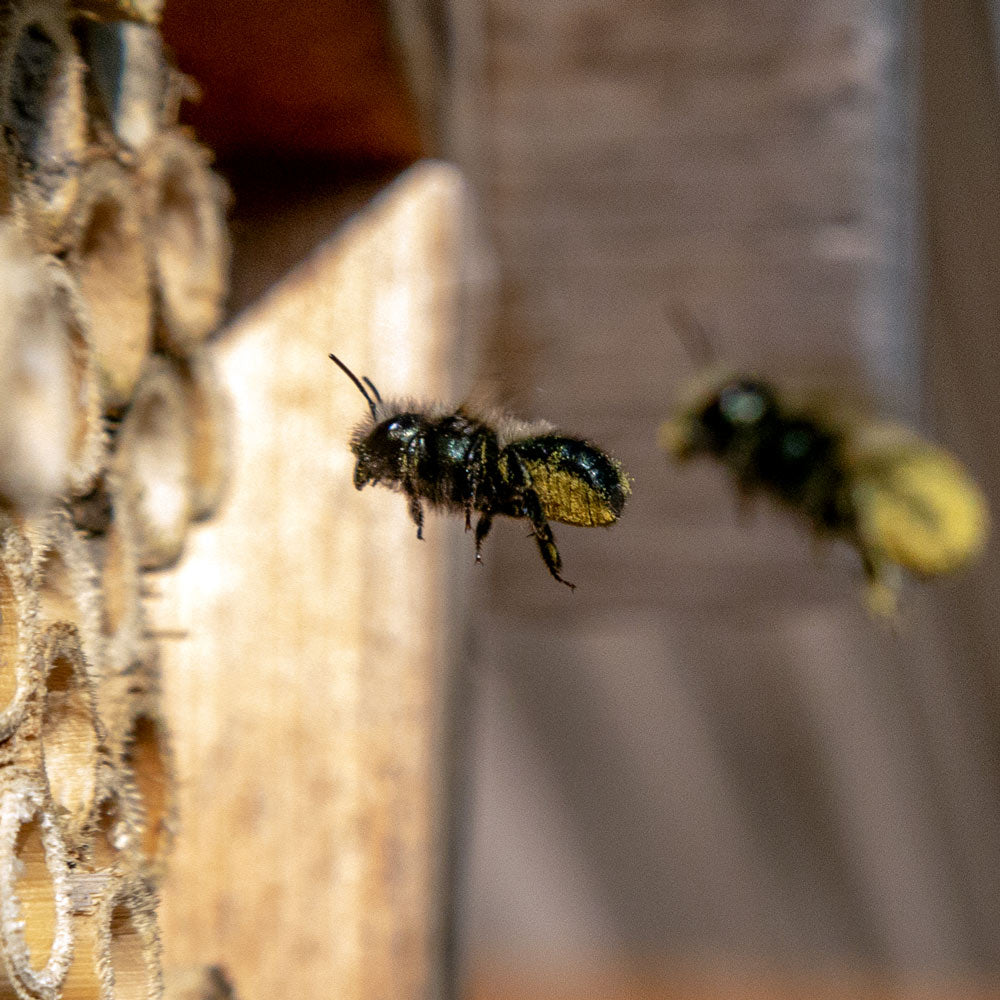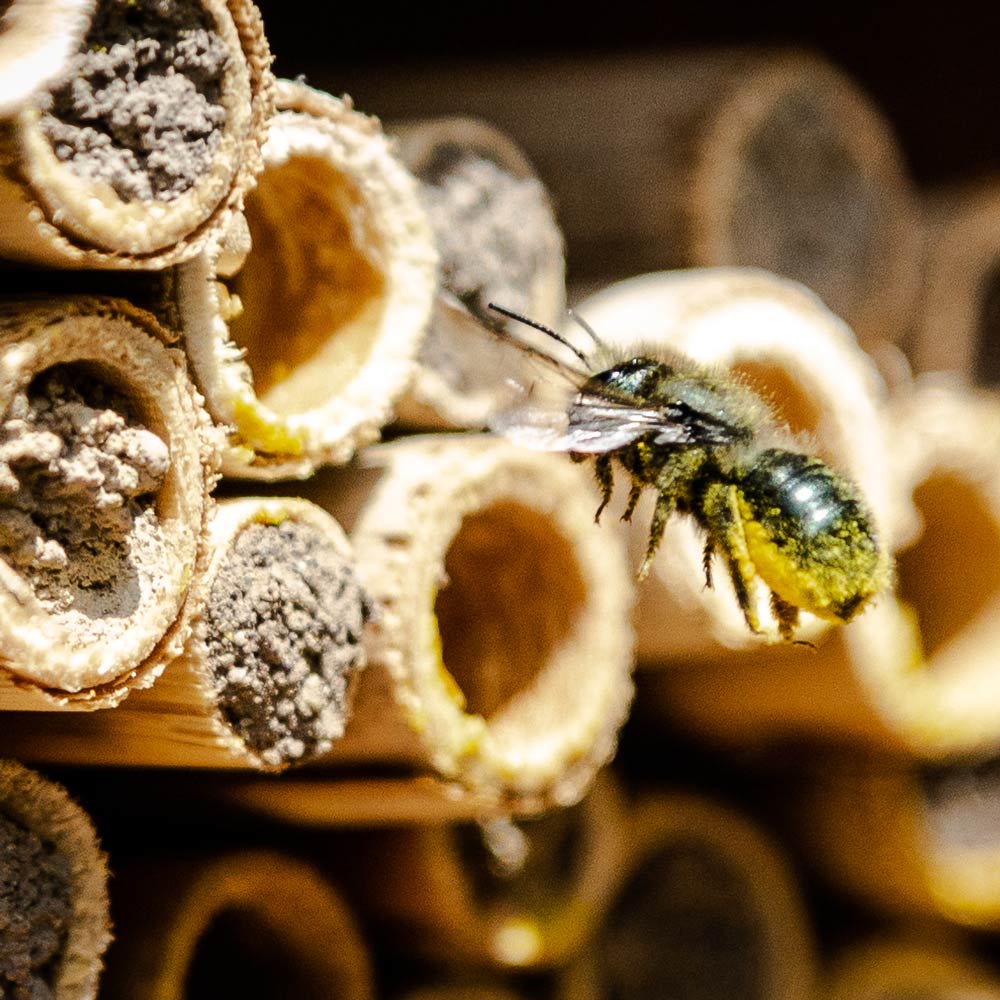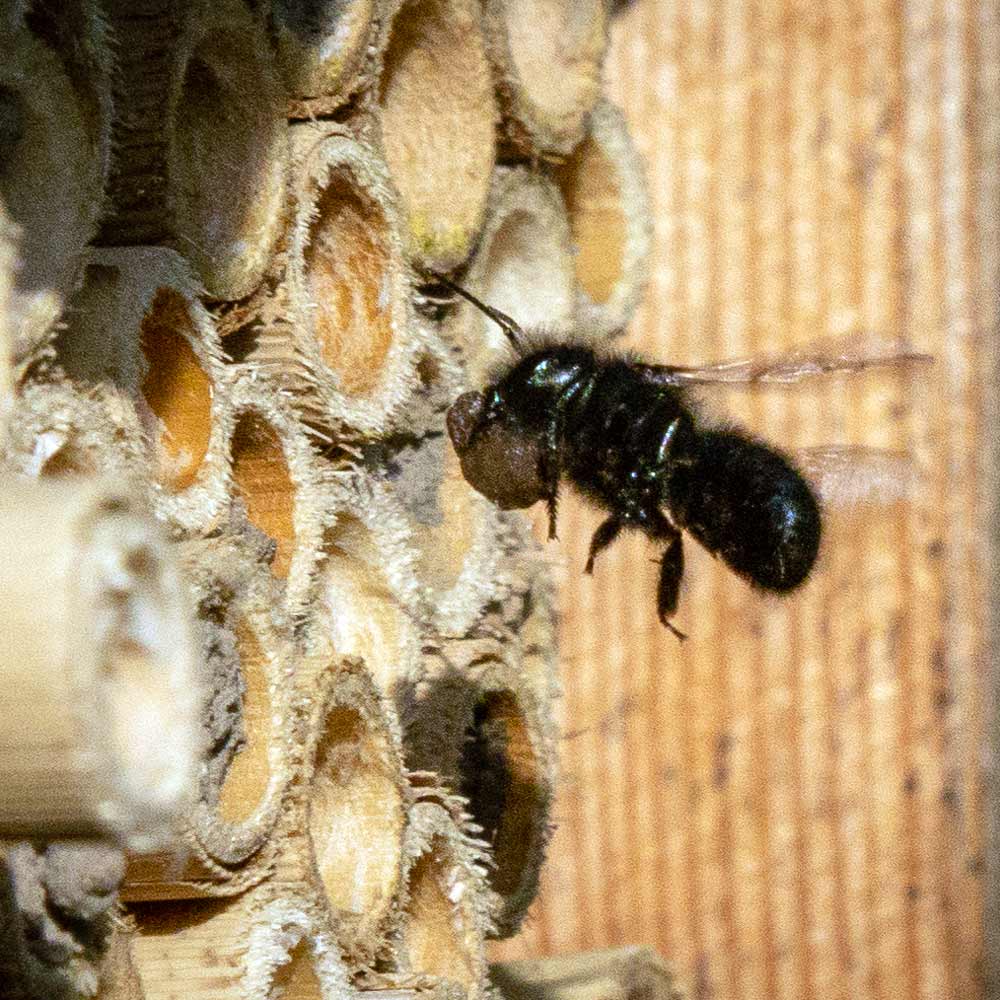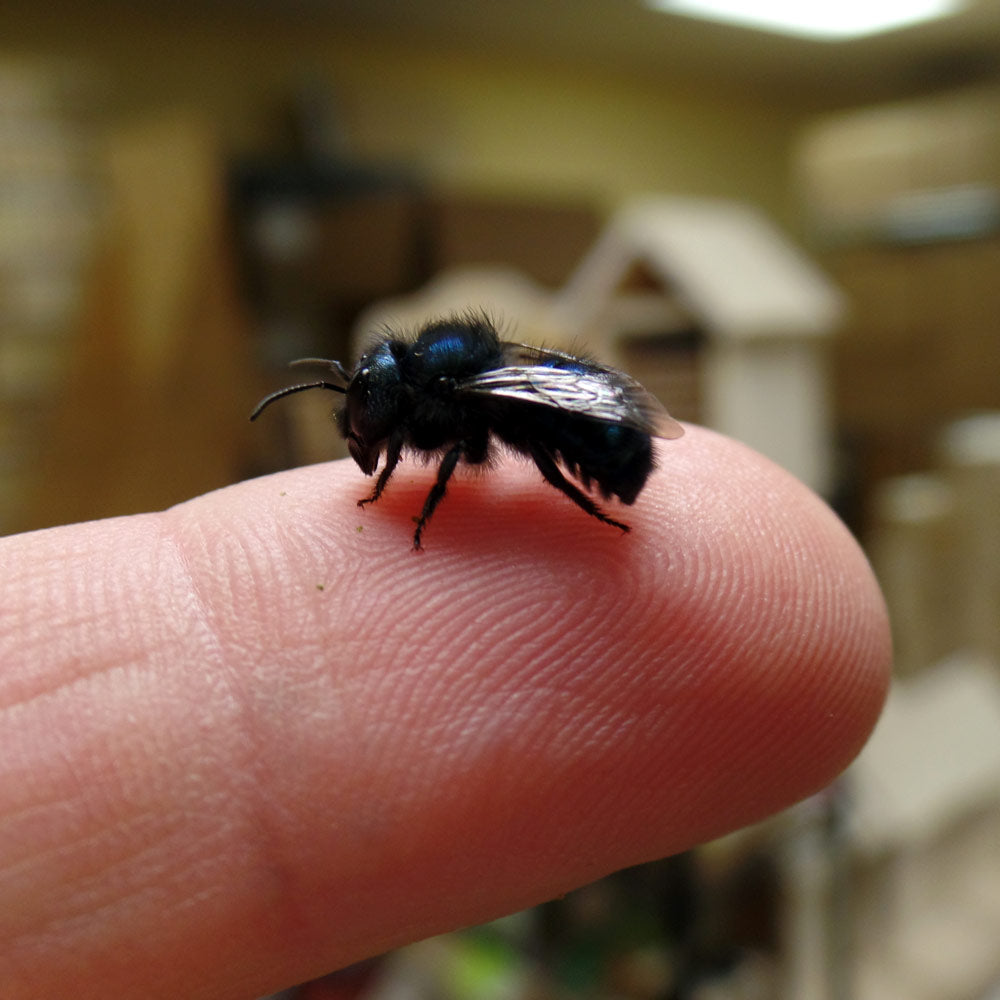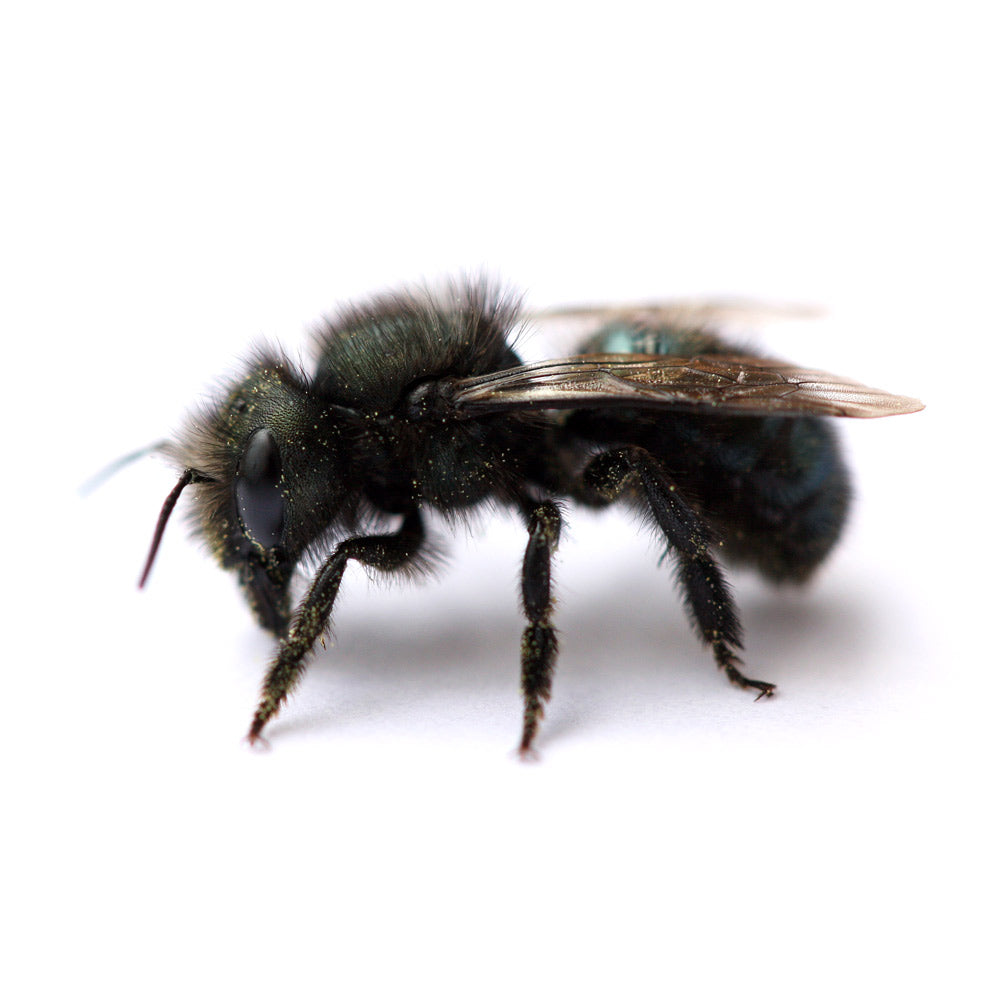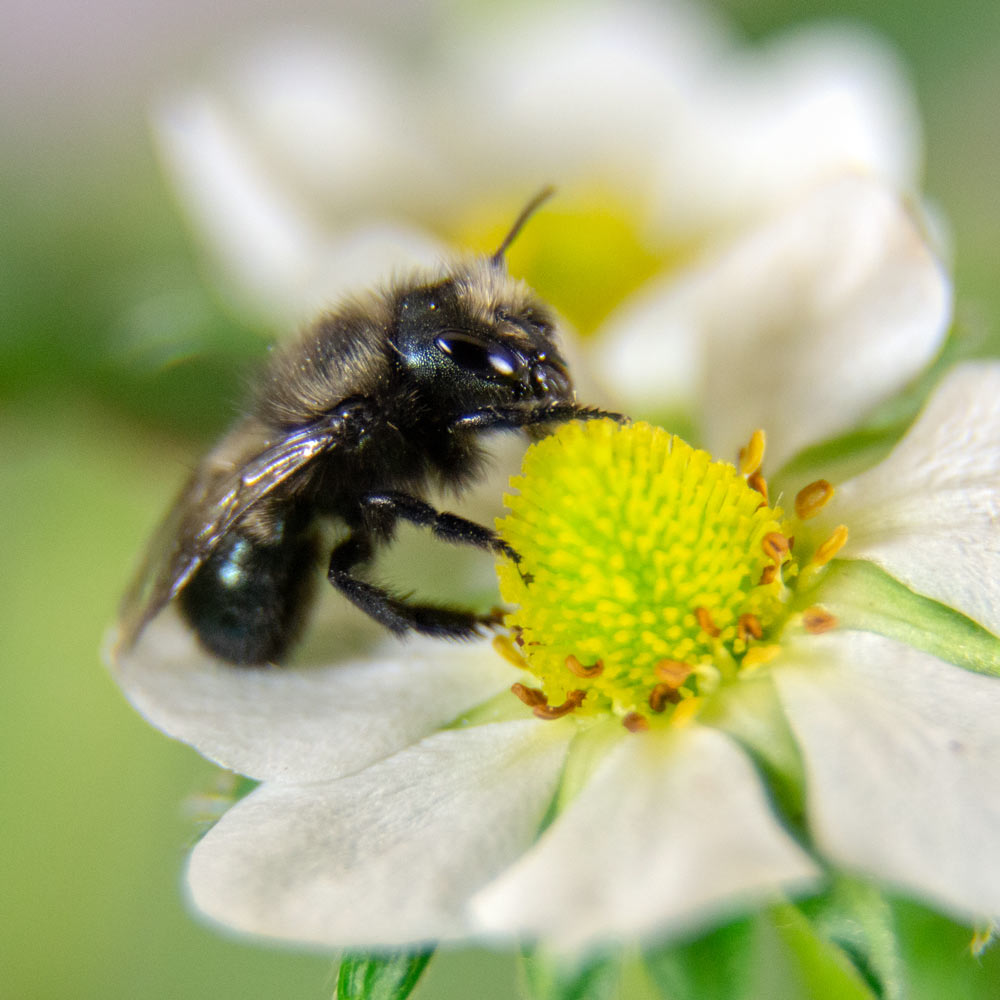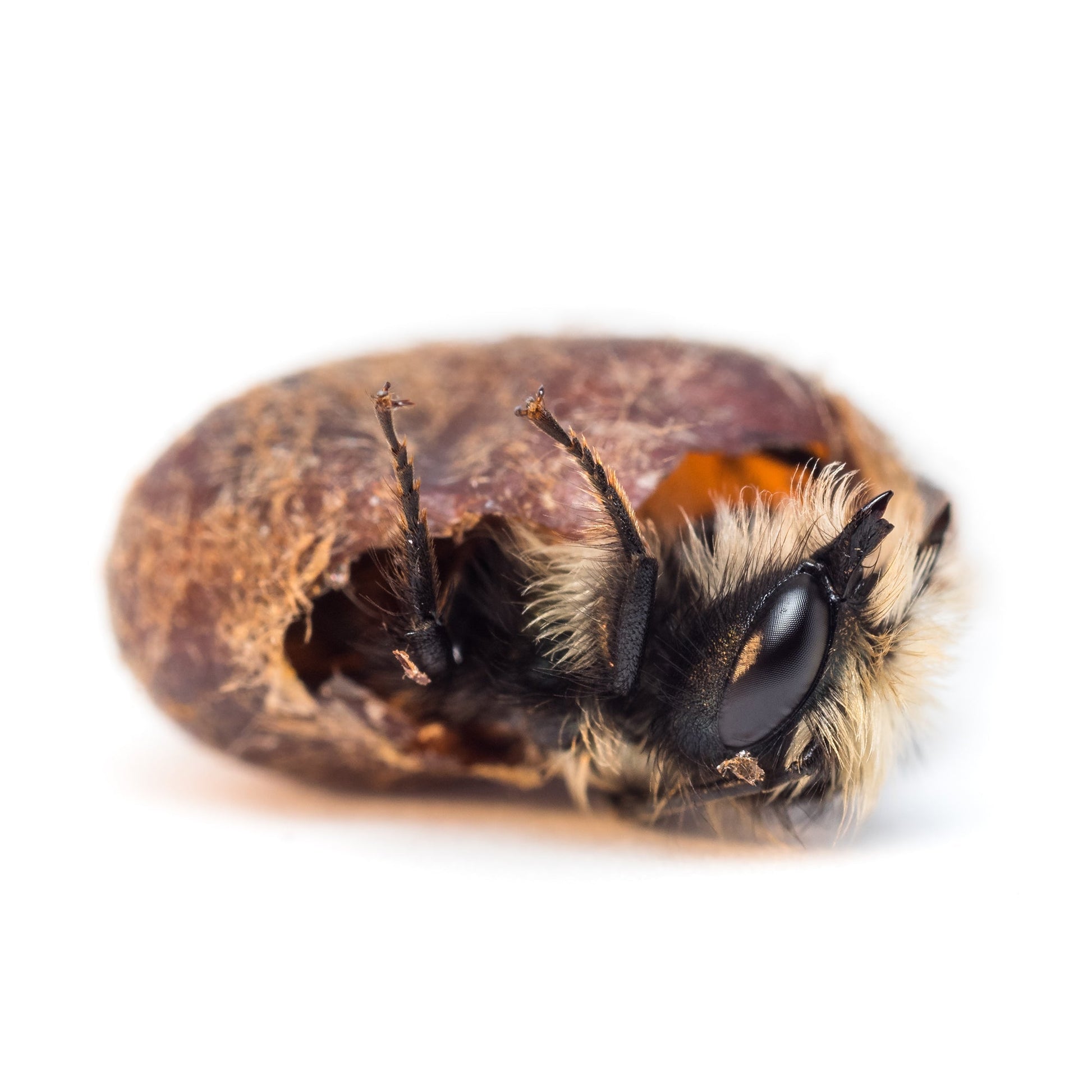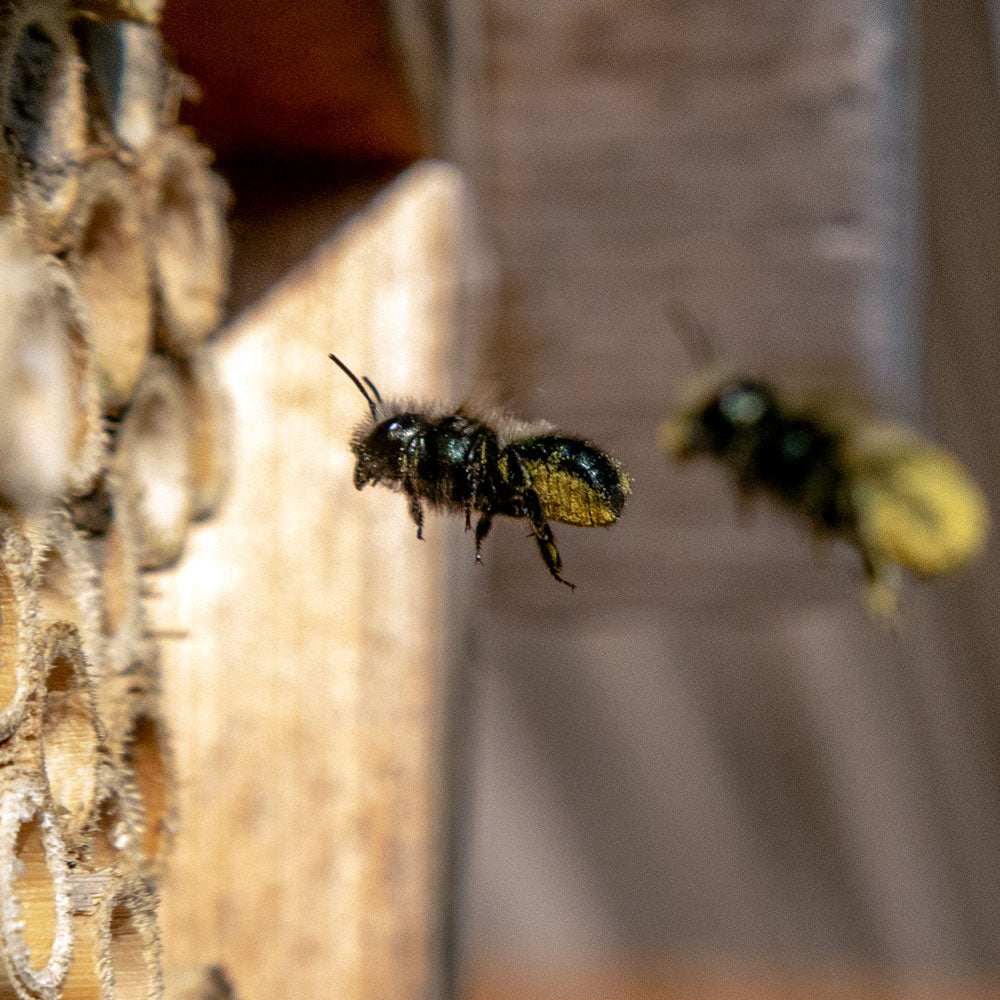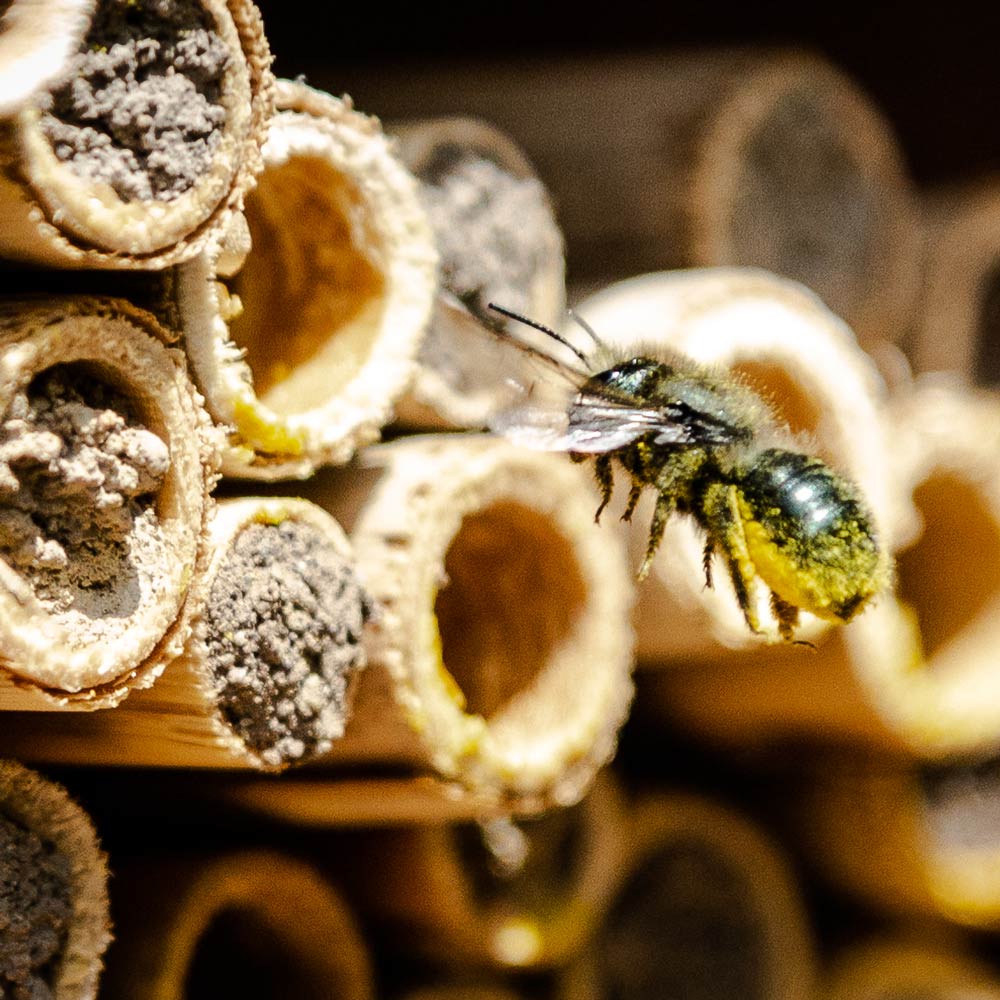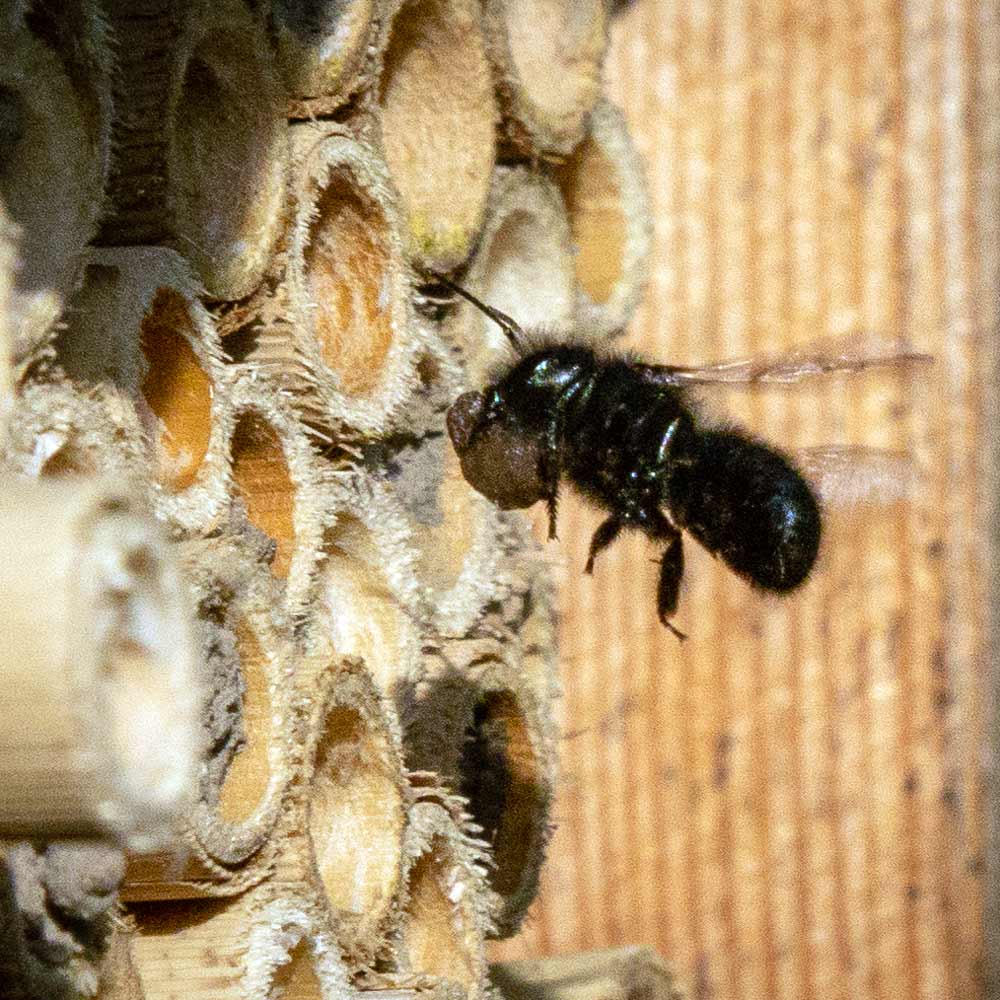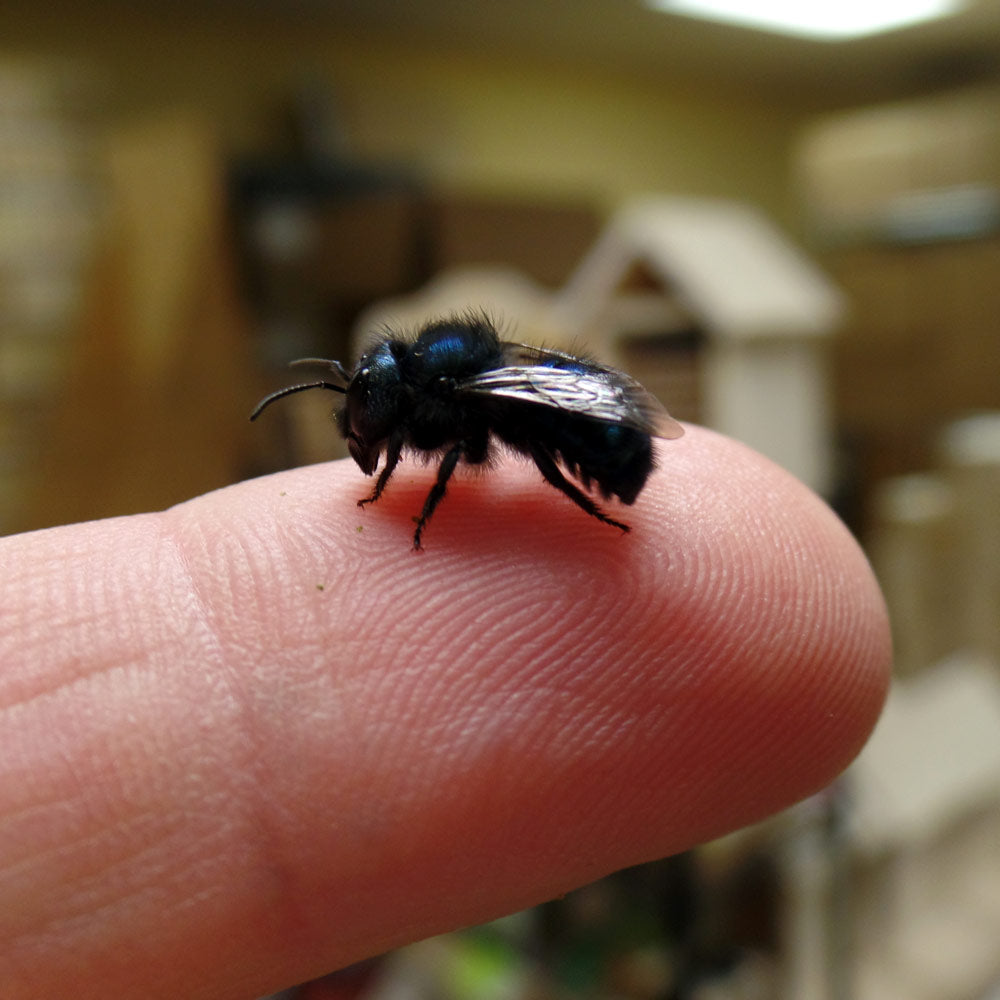Item Number: PBE2001A
Orchard Mason Bees (20 ct)
Orchard Mason Bees (20 ct)
1 mason bee can do the work of 100 honey bees
Spring Mason Bees are perfect for fruit and nut trees, berries, and spring-blooming flowers. These super pollinators visit thousands of flowers per day with a pollination rate of 99%!
Mason bees are active in your garden for 4-6 weeks.
Please note: All bees ship separately from products, so they will not arrive in the same package unless otherwise specified. For the health of the bees, we only ship mason bee cocoons on Mondays (Feb - April) to ensure they do not get stuck in transit over the weekend.
Once your bees arrive, it's up to you to provide these pollinators with healthy habitats to forage and nest to be successful.
The bees need pollen. We recommend picking a shipping date that is two weeks ahead of when you expect your spring plants to bloom.
Specifications:
- 20 mason bee cocoons, about 8 female and 12 male cocoons (natural ratio of males to females)
Features:
- Mason bees forage in cooler and wet weather
- A single mason bee can do the work of 100 honey bees!
- Gentle and easy to raise, making them safe around kids and pets!
- All cocoons have been harvested and washed to prevent the spread of disease and reduce pests.
- Spring mason bees are common across North America. When you purchase from us, you receive bees specific to your region to give them the best chance of survival and reduce the spread of disease.
Mason bees, scientifically known as Osmia species, are incredible pollinators that play a crucial role in the ecosystem, particularly during the spring season. These small, solitary bees are excellent pollinators for fruit and nut trees, berries, and spring-blooming flowers. In this comprehensive guide, we will explore the fascinating world of mason bees, their life cycle, habits, and the importance of providing them with suitable habitats for foraging and nesting.
The Life Cycle of Mason Bees
Mason bees, unlike honey bees, are solitary creatures, meaning they don't live in colonies. Their life cycle consists of four stages: egg, larva, pupa, and adult bee. In the early spring, adult mason bees emerge from their cocoons, and the females immediately start foraging for nectar and pollen to provision their nests. These bees are known for their incredible pollination efficiency, visiting thousands of flowers per day with an impressive pollination rate of 99%.
Mason bees are active in gardens for a relatively short period, usually spanning 4 to 6 weeks. Understanding their life cycle is crucial for those looking to support these pollinators effectively. To learn more about the specifics of the mason bee life cycle, it is advisable to delve into detailed resources available on the subject.
Providing Healthy Habitats for Mason Bees
Upon receiving mason bees, it becomes the responsibility of the caretaker to provide them with suitable habitats for foraging and nesting. These habitats, often referred to as mason bee houses, can be essential in ensuring the success of these pollinators. It's important to note that bees and related products are shipped separately, and special care is taken to ship mason bee cocoons only on Mondays (February - April) to avoid any weekend delays that might jeopardize the health of the bees.
One crucial aspect of mason bee habitats is the availability of clay-rich soil. Mason bees are clay-using bees, and having exposed, moist, clay-rich soil is essential for their nesting activities.
Specifications and Features of Mason Bee Cocoons
When purchasing mason bee cocoons, it is essential to understand the specifications and features to ensure optimal conditions for these valuable pollinators. Typically, a package may include 20 mason bee cocoons, with a natural ratio of about 8 female and 12 male cocoons. Release instructions are provided to guide caretakers on the proper handling and release of the bees.
Some notable features of mason bees include their ability to forage in cooler and wet weather conditions, making them versatile pollinators. Surprisingly, a single mason bee can accomplish the pollination work of 100 honey bees. Moreover, these bees are known for their gentle nature, making them safe to raise around children and pets.
All mason bee cocoons offered for sale have been carefully harvested and washed. This process is crucial to prevent the spread of diseases and reduce the risk of pests affecting the bee population. Additionally, when purchasing mason bees, it's noteworthy that they are specific to different regions in North America. This regional specificity enhances their chances of survival and contributes to reducing the spread of diseases within bee populations.
Mason Bees vs. Honey Bees: Understanding the Differences
While honey bees are the more commonly known pollinators, mason bees offer unique advantages. One significant distinction lies in their solitary nature; mason bees do not form colonies and live independently. This characteristic makes them easier to raise and handle. Furthermore, their efficiency as pollinators, with a single mason bee accomplishing the work of many honey bees, makes them invaluable contributors to plant reproduction.
Mason Bee Houses: DIY or Pre-Made Options
Creating a conducive environment for mason bees involves providing suitable nesting options. Mason bee houses can be either purchased pre-made or crafted as do-it-yourself (DIY) projects. These houses typically consist of stacked tubes or drilled wood blocks where mason bees can lay their eggs. The availability of such houses encourages mason bees to nest, supporting their life cycle and ensuring a thriving population.
Caring for Mason Bees: Tips for Success
Ensuring the well-being of mason bees involves thoughtful planning and care. Caretakers are advised to select a shipping date for mason bee cocoons that is at least two weeks ahead of the expected bloom of spring plants. This allows the bees ample time to acclimate to their new environment and ensures they have sufficient pollen available for foraging.
Vendor Direct Flat Rate Shipping - $3

Check Your Zone Compatibility:
Compatible with your zone.
Growing Zone for
,

Our Guarantee To You
Since 1976, we've served our customers at every stage of growing. Please contact us at any time. We are happy to support and assist you.
Description
Description
Spring Mason Bees are perfect for fruit and nut trees, berries, and spring-blooming flowers. These super pollinators visit thousands of flowers per day with a pollination rate of 99%!
Mason bees are active in your garden for 4-6 weeks.
Please note: All bees ship separately from products, so they will not arrive in the same package unless otherwise specified. For the health of the bees, we only ship mason bee cocoons on Mondays (Feb - April) to ensure they do not get stuck in transit over the weekend.
Once your bees arrive, it's up to you to provide these pollinators with healthy habitats to forage and nest to be successful.
The bees need pollen. We recommend picking a shipping date that is two weeks ahead of when you expect your spring plants to bloom.
Specifications:
- 20 mason bee cocoons, about 8 female and 12 male cocoons (natural ratio of males to females)
Features:
- Mason bees forage in cooler and wet weather
- A single mason bee can do the work of 100 honey bees!
- Gentle and easy to raise, making them safe around kids and pets!
- All cocoons have been harvested and washed to prevent the spread of disease and reduce pests.
- Spring mason bees are common across North America. When you purchase from us, you receive bees specific to your region to give them the best chance of survival and reduce the spread of disease.
Mason bees, scientifically known as Osmia species, are incredible pollinators that play a crucial role in the ecosystem, particularly during the spring season. These small, solitary bees are excellent pollinators for fruit and nut trees, berries, and spring-blooming flowers. In this comprehensive guide, we will explore the fascinating world of mason bees, their life cycle, habits, and the importance of providing them with suitable habitats for foraging and nesting.
The Life Cycle of Mason Bees
Mason bees, unlike honey bees, are solitary creatures, meaning they don't live in colonies. Their life cycle consists of four stages: egg, larva, pupa, and adult bee. In the early spring, adult mason bees emerge from their cocoons, and the females immediately start foraging for nectar and pollen to provision their nests. These bees are known for their incredible pollination efficiency, visiting thousands of flowers per day with an impressive pollination rate of 99%.
Mason bees are active in gardens for a relatively short period, usually spanning 4 to 6 weeks. Understanding their life cycle is crucial for those looking to support these pollinators effectively. To learn more about the specifics of the mason bee life cycle, it is advisable to delve into detailed resources available on the subject.
Providing Healthy Habitats for Mason Bees
Upon receiving mason bees, it becomes the responsibility of the caretaker to provide them with suitable habitats for foraging and nesting. These habitats, often referred to as mason bee houses, can be essential in ensuring the success of these pollinators. It's important to note that bees and related products are shipped separately, and special care is taken to ship mason bee cocoons only on Mondays (February - April) to avoid any weekend delays that might jeopardize the health of the bees.
One crucial aspect of mason bee habitats is the availability of clay-rich soil. Mason bees are clay-using bees, and having exposed, moist, clay-rich soil is essential for their nesting activities.
Specifications and Features of Mason Bee Cocoons
When purchasing mason bee cocoons, it is essential to understand the specifications and features to ensure optimal conditions for these valuable pollinators. Typically, a package may include 20 mason bee cocoons, with a natural ratio of about 8 female and 12 male cocoons. Release instructions are provided to guide caretakers on the proper handling and release of the bees.
Some notable features of mason bees include their ability to forage in cooler and wet weather conditions, making them versatile pollinators. Surprisingly, a single mason bee can accomplish the pollination work of 100 honey bees. Moreover, these bees are known for their gentle nature, making them safe to raise around children and pets.
All mason bee cocoons offered for sale have been carefully harvested and washed. This process is crucial to prevent the spread of diseases and reduce the risk of pests affecting the bee population. Additionally, when purchasing mason bees, it's noteworthy that they are specific to different regions in North America. This regional specificity enhances their chances of survival and contributes to reducing the spread of diseases within bee populations.
Mason Bees vs. Honey Bees: Understanding the Differences
While honey bees are the more commonly known pollinators, mason bees offer unique advantages. One significant distinction lies in their solitary nature; mason bees do not form colonies and live independently. This characteristic makes them easier to raise and handle. Furthermore, their efficiency as pollinators, with a single mason bee accomplishing the work of many honey bees, makes them invaluable contributors to plant reproduction.
Mason Bee Houses: DIY or Pre-Made Options
Creating a conducive environment for mason bees involves providing suitable nesting options. Mason bee houses can be either purchased pre-made or crafted as do-it-yourself (DIY) projects. These houses typically consist of stacked tubes or drilled wood blocks where mason bees can lay their eggs. The availability of such houses encourages mason bees to nest, supporting their life cycle and ensuring a thriving population.
Caring for Mason Bees: Tips for Success
Ensuring the well-being of mason bees involves thoughtful planning and care. Caretakers are advised to select a shipping date for mason bee cocoons that is at least two weeks ahead of the expected bloom of spring plants. This allows the bees ample time to acclimate to their new environment and ensures they have sufficient pollen available for foraging.
Vendor Direct Flat Rate Shipping - $3
Shipping Information
Shipping Information
Cannot ship to the following states: AK, HI, PR, VI, GU
Shipping Weight: 0.25 lb
Dimensions: 1.0"L x 1.0"W x 1.0"H
Features
Features
Characteristics
Characteristics
Use Instructions
Use Instructions
Useful Information
Useful Information
Guarantee
Guarantee
Share
